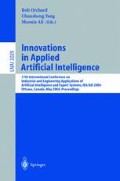Abstract
This study proposes an expert system that applied in Taiwan motorcycle’s fault detection and maintenance. An expert’s knowledge structure was explored, to construct a knowledge base which has the expertise and then to build a friendly human-computer interface. This study will examine the knowledge structures of a novice group and an expert group by using knowledge network organizing method. And the similarity between theses two groups is assessed from network structure indices. The expected results will indicate the knowledge structure of an expert group is more organized than a novice group and then a suitable expert system will be developed. To develop the expert system for the fault detection and maintenance can not only promote the maintenance efficiency and quality, but also make up for the shortage of Taiwan motorcycle’s maintainers. It also, of course, can serve as a training tool for maintainers and shorten learning time effectively.
Access this chapter
Tax calculation will be finalised at checkout
Purchases are for personal use only
Preview
Unable to display preview. Download preview PDF.
References
Berrais, A.: Knowledge-based expert system: user interface implications. Advances in engineering Software 28, 31–41 (1997)
Hayes-Roth, F.: Knowledge Systems: An Introduction. Library Hi Tech. 10(1-2) (1992)
Goldsmith, T.E., Johnson, P.J., Acton, W.H.: Assessing structural knowledge. Journal of Educational Psychology 83(1), 88–96 (1991)
Gonzalvo, P., Canas, J.J., Bajo, M.: Structural representations in knowledge acquisition. Journal of Educational Psychology 84(4), 601–616 (1994)
Lin, H.-F.: A Study of Knowledge Representation and Concept Learning: Using Pathfinder Network as Assessment Tool. Journal of Education and Psychology 24, 229–262 (2001)
Lin, H.-F., Yu, M.-N.: An Evaluative Research Study on Learning the Mathematics Concept of Algebra by High School Students–Using the Quadratic Equation as Example. Journal of Education and Psychology 24, 303–326 (2001)
Gordon, J.L.: Creating knowledge maps by exploiting dependent relationships. Knowledge-Based Systems 13, 71–79 (2000)
Kwahk, J., Han, S.H.: A methodology for evaluating the usability of audiovisual consumer electronic products. Applied Ergonomics 33, 419–431 (2002)
Chau, K.W., Chuntian, C., Li, C.W.: Knowledge management system on flow and water quality modeling. Expert Systems with Applications 22, 321–330 (2002)
Yi-Chun, L.: Apply Expert System to the Fault Detection of HVAC, A master paper in National Taiwan University of Science and Technology Department of Electrical Engineering (2002)
Yu, M.-N., Lin, H.-F., Tsai, C.-Y.: Cognitively Diagnostic Assessment of Mathematical Knowledge Structures of Elementary School Children. Journal of Education and Psychology 24, 263–302 (2001)
Geraghty, P.J.: Environmental Assessment and the Application of Expert Systems: an Overview. Journal of Environmental Management 39, 27–38 (1993)
Bromme, R., Tillema, H.: Fusing experience and theory: The structure of professional knowledge. Learning and Instruction 5, 261–267 (1995)
Statistics of Transportation & Communications (2002), http://www.motc.gov.tw
Han, S.H., Yun, M.H., Kim, K.-J., Kwahk, J.: Evaluation of product usability: development and validation of usability dimensions and design elements based on empirical models. International Journal of Industrial Ergonomics 26, 477–488 (2000)
McGriff, S.J., Van Meter, P.: Measuring Cognitive Structure: An Overview of Pathfinder Networks and Semantic Networks (2001), http://www.personal.psu.edu/faculty/s/j/sjm256/portfolio/kbase/Theories&Models/Cognitivism/Cognitive-Structure.pdf
Su, K.W., Hwang, S.L., Hendtlass, T.: Reliability-centered maintenance management: a case study on a public bus system. International Journal of Industrial Engineering-Theory, Application, and Practice 7(3), 219–228 (2000a)
Acton, W.H., Johnson, P.J., Goldsmith, T.E.: Structural Knowledge Assessment: Comparison of Referent Structures. Journal of Educational Psychology 86(2), 303–311 (1994)
Author information
Authors and Affiliations
Editor information
Editors and Affiliations
Rights and permissions
Copyright information
© 2004 Springer-Verlag Berlin Heidelberg
About this paper
Cite this paper
Su, KW., Hwang, SL., Zhou, YF. (2004). The Exploration and Application of Knowledge Structures in the Development of Expert System: A Case Study on a Motorcycle System. In: Orchard, B., Yang, C., Ali, M. (eds) Innovations in Applied Artificial Intelligence. IEA/AIE 2004. Lecture Notes in Computer Science(), vol 3029. Springer, Berlin, Heidelberg. https://doi.org/10.1007/978-3-540-24677-0_35
Download citation
DOI: https://doi.org/10.1007/978-3-540-24677-0_35
Publisher Name: Springer, Berlin, Heidelberg
Print ISBN: 978-3-540-22007-7
Online ISBN: 978-3-540-24677-0
eBook Packages: Springer Book Archive

